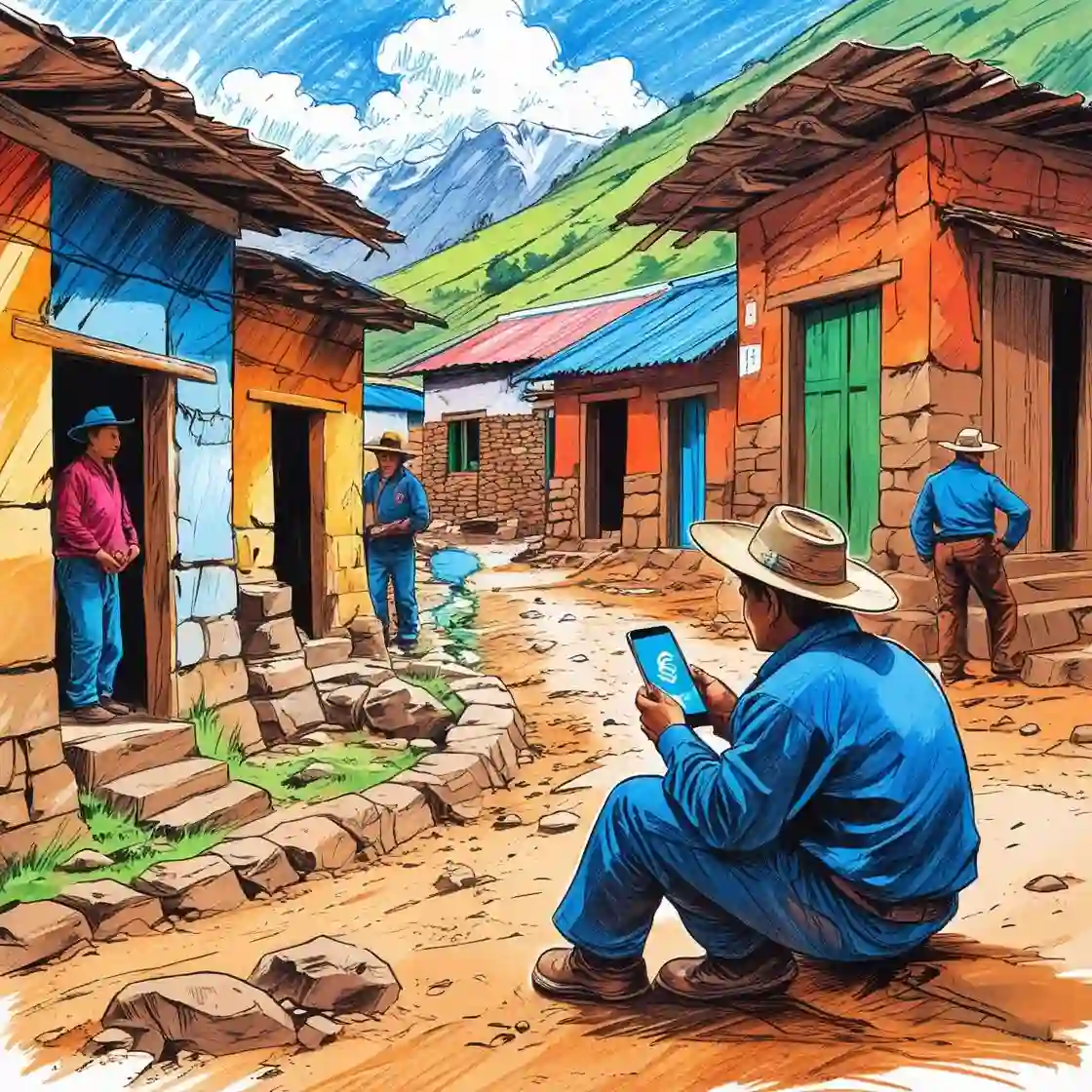How Crypto Remittances Are Changing Life in the Amazon Jungle Examples from Peru

Deep in the Peruvian Amazon, where the Ucayali River winds through dense jungle, Maria checks her smartphone.
The 34-year-old mother of three just received notification that her husband, working construction in Lima, sent their monthly support payment.
But this isn't a traditional bank transfer - it's USDT, a digital dollar that arrived in seconds rather than the usual week-long wait at the nearest bank, located a costly three-hour boat ride away.
Maria's story represents a quiet revolution spreading through Latin America's most remote regions.
As crypto remittances in Latin America surge by over 40% in 2024, even the most isolated communities are discovering that blockchain technology can succeed where traditional banking has failed for generations.
Blockchain for Jungle Protection
Innovative blockchain technology initiatives protecting Peru's rainforests through sustainable development
Explore Blockchain SolutionsBlockchain Fights Deforestation
How blockchain technology, JBS projects, and NFTs are revolutionizing Amazon rainforest conservation
Discover NFT ProjectsThe Digital Revolution Reaches the Rainforest
The transformation of crypto remittances Amazon jungle communities are experiencing is nothing short of remarkable. Peru, with its 40.6% increase in crypto adoption growth Peru statistics show, has become an unexpected leader in bringing financial services to populations that banks have ignored for decades.
The numbers tell a compelling story. Latin America received nearly $415 billion in cryptocurrency between July 2023 and June 2024, with Peru emerging as a key player in this financial revolution. While major cities like Lima grab headlines, the real transformation is happening in places where electricity is still a luxury and internet connectivity remains a challenge.
What makes crypto remittances Latin America particularly powerful in jungle regions is their ability to bypass traditional infrastructure entirely. A smartphone and intermittent internet connection are all that's needed to participate in the global financial system - a reality that would have seemed impossible just five years ago.
Why Crypto Beats Traditional Transfers in Remote Peru
Speed and Accessibility Advantages
The advantages of cryptocurrency transfers become even more pronounced in remote areas. Traditional remittance methods in the Peruvian Amazon face numerous obstacles that crypto elegantly sidesteps.
Comparison Table: Traditional vs Crypto Transfers in Amazon Communities
| Factor | Traditional Banking | Crypto Remittances |
|---|---|---|
| Transfer Time | 3-7 days | 10 minutes - 1 hour |
| Physical Travel Required | 2-6 hours by boat | None |
| Transaction Fees | 8-12% | 1-3% |
| Documentation Needed | Multiple IDs, proof of address | Phone number, basic KYC |
| Operating Hours | Monday-Friday, 9-3pm | 24/7/365 |
| Weather Dependency | High (rivers impassable in storms) | None |
| Minimum Transfer Amount | Often $50-100 | As low as $1 |
For indigenous communities scattered along tributaries of the Amazon, these differences are life-changing. When the rainy season makes rivers dangerous to navigate, crypto transfers continue flowing. When banks close for holidays, stablecoin Peru remittances keep arriving.
The Stablecoin Solution
The volatility that once made cryptocurrency impractical for remittances has been solved by stablecoins, particularly USDT (Tether). In Peru's jungle communities, USDT has become the de facto digital dollar, offering the stability of USD with the convenience of cryptocurrency.
Local merchants in towns like Pucallpa and Iquitos now accept USDT payments, creating a circular economy where received remittances can be spent directly without conversion. This ecosystem development is crucial for sustainable adoption - when crypto can be both received and spent locally, it becomes more than just a transfer mechanism.
Peruvian Amazon Hidden Facts
Discover the untold truths about the Peruvian Amazon that every investor and visitor should know
Uncover the TruthPeru Expats Complete Guide 2025
Comprehensive guide covering all pros and cons of living in Peru as an expat - everything you need to know
Explore Expat GuideReal Cases in Peruvian Jungles
The Shipibo-Conibo Success Story
The Shipibo-Conibo people, one of Peru's largest indigenous groups living along the Ucayali River, have embraced crypto remittances with remarkable enthusiasm. Young Shipibo adults working in Lima's markets and restaurants send money home using Binance's peer-to-peer platform, avoiding the predatory fees of traditional money transfer operators.
José, a 28-year-old Shipibo man working in Lima's San Juan de Lurigancho district, explains the transformation: "Before, I would send 500 soles home and my family would receive maybe 440 after all the fees. The trip to collect it would cost another 30 soles in fuel. Now I send USDT, and they receive almost everything. My mother learned to use the wallet app faster than she learned to use WhatsApp."
The impact extends beyond individual families. Shipibo artisan cooperatives now receive payments from international buyers in Bitcoin Peru jungle communities are using for commerce, eliminating weeks of waiting for international wire transfers to clear through multiple banks.
Educational Initiatives in Madre de Dios
In the gold-mining region of Madre de Dios, where informal economy dominates and environmental concerns clash with economic needs, crypto education programs are creating new opportunities. Local NGOs partnered with crypto platforms to teach financial literacy alongside digital wallet usage.
The results have been transformative. Miners who previously lost significant portions of their earnings to middlemen now receive direct payments in cryptocurrency. Environmental groups use blockchain to create transparent donation channels, ensuring funds reach conservation projects without bureaucratic delays.
Small Business Revolution in Iquitos
Iquitos, the world's largest city inaccessible by road, has become an unlikely crypto hub. Small businesses that struggled with cash flow due to slow bank transfers now use stablecoins for supplier payments. The city's isolation, once an economic handicap, has made it surprisingly receptive to borderless digital finance.
Restaurant owners import supplies from Colombia using USDT, tour operators receive bookings from international clients via Bitcoin, and even the local mototaxi drivers have begun accepting crypto payments through QR codes displayed on their vehicles.

Overcoming Infrastructure Challenges
Internet Connectivity Solutions
The biggest obstacle to crypto adoption growth Peru faces in jungle regions remains internet connectivity. However, innovative solutions are emerging:
Satellite Internet Expansion: Starlink and similar services are bringing reliable internet to previously disconnected communities. Villages pool resources to share connections, making the $100 monthly fee manageable when split among multiple families.
Mobile Network Growth: Peruvian telecom companies, recognizing the opportunity, are expanding 4G coverage along major rivers. While still limited, mobile data is increasingly available in populated areas.
Offline Transaction Methods: Some platforms are developing SMS-based transaction systems that work on basic phones without internet, though these remain in testing phases.
Digital Literacy Programs
Teaching digital and financial literacy simultaneously has proven effective. Programs typically follow this structure:
- Basic smartphone skills - navigating apps, understanding security
- Wallet creation and backup - emphasizing seed phrase importance
- Sending and receiving - practicing with small amounts
- Security best practices - avoiding scams, verifying recipients
- Local exchange options - converting to local currency when needed
Community leaders play crucial roles as trusted educators, translating complex concepts into local languages and cultural contexts. The Asháninka people, for instance, have developed their own terminology for blockchain concepts, making education more accessible.
Platform Adoption and Local Solutions
Major Platforms Serving the Region
Binance dominates the Peruvian market with its extensive P2P network. Users can trade directly with each other, exchanging soles for crypto without traditional banking intermediaries. The platform's Spanish-language support and relatively simple interface have made it popular even among users with limited tech experience.
Bitso, while Mexican-based, has expanded services to Peru and offers some of the lowest fees for remittances. Their focus on the remittance market makes them particularly relevant for jungle communities receiving money from urban areas.
Local Solutions are emerging as well. Peruvian startups are creating simplified apps designed specifically for remittance receivers, with interfaces optimized for low-bandwidth connections and first-time crypto users.
The Role of Local Exchanges
Small, informal exchange points have sprouted in jungle towns, operated by tech-savvy locals who help others convert crypto to cash. These informal exchanges, while operating in legal gray areas, provide crucial last-mile services for those who need physical currency.
In Puerto Maldonado, a small shop owner runs an informal exchange from her store, charging 2% to convert USDT to soles. "People trust me more than apps," she explains. "I help them set up wallets, teach them security, and I'm here if something goes wrong."
Ecological Expertise of the Amazon
Professional ecological assessment and expertise services for Amazon rainforest conservation projects
View Expertise ServicesInformation Asymmetry in South America
Understanding market inefficiencies and information gaps in South American business landscapes
Read Market AnalysisEconomic Impact on Indigenous Communities
Financial Inclusion Metrics
The impact of crypto remittances Amazon jungle regions are experiencing goes beyond individual transactions. Entire communities are gaining access to financial services for the first time:
- Savings Capability: Families can now save in stable currencies, protecting against the sol's fluctuations
- Investment Access: Small amounts can be invested in global markets previously accessible only to wealthy urbanites
- Credit Building: Transaction histories on blockchain could eventually support credit applications
- Economic Autonomy: Communities become less dependent on exploitative middlemen
Preserving Cultural Heritage Through Blockchain
Interestingly, blockchain technology is also being used to protect indigenous cultural heritage. Shipibo designs are being registered as NFTs, ensuring artists receive royalties when their patterns are used commercially. This unexpected use case shows how crypto remittances Latin America is receiving are part of a broader technological empowerment.

Environmental and Social Considerations
Reducing Carbon Footprint
Crypto remittances significantly reduce the carbon footprint of financial transactions in the Amazon. Traditional banking requires:
- Boat trips consuming gallons of fuel
- Bank branches with air conditioning and electricity
- Physical cash transportation via planes and boats
Digital transactions eliminate these environmental costs, aligning with conservation efforts in the world's most important ecosystem.
Challenges and Concerns
However, adoption isn't without challenges:
Scam Vulnerability: Low digital literacy makes some users vulnerable to scams. Education programs now emphasize security as much as usage.
Regulatory Uncertainty: Peru's crypto regulations remain unclear, creating anxiety about potential future restrictions.
Technology Dependence: Power outages and device failures can temporarily cut off access to funds, though this risk exists with traditional banking too.
Peru Politics & Business Impact
In-depth analysis of Peru's political landscape and its effects on business opportunities with future forecasts
Read Full AnalysisPeru Visas & Company Registration
Complete guide to obtaining various types of visas and registering companies in Peru - step by step process
Learn Registration ProcessFuture Trends for 2025-2026
Predicted Growth Patterns
Based on current trajectories, crypto adoption growth Peru is expected to accelerate:
- User Base: Expected to double by end of 2025, reaching 3 million active users
- Transaction Volume: Projected to exceed $5 billion annually by 2026
- Merchant Adoption: Over 10,000 businesses expected to accept crypto payments by 2025
- Rural Penetration: 40% of rural communities expected to have crypto users by 2026
Technological Advancements
Several technological developments will further facilitate adoption:
Lightning Network Implementation: Faster, cheaper Bitcoin transactions will make small payments more practical.
Central Bank Digital Currency: Peru's potential digital sol could bridge traditional and crypto finance.
Improved User Interfaces: Apps designed specifically for low-literacy users with voice commands and visual guides.
Mesh Networks: Communities are experimenting with mesh networks that provide local internet connectivity without traditional infrastructure.
Government and Institutional Support
The Peruvian government is slowly recognizing crypto's potential for financial inclusion. Proposed initiatives include:
- Digital literacy programs in rural schools
- Regulatory sandboxes for crypto businesses
- Partnerships with platforms for remittance corridors
- Tax incentives for businesses accepting digital payments
The Multiplication Effect
The impact of crypto remittances extends far beyond individual recipients. Each successful transaction creates ripple effects:
Economic Multipliers: Money received via crypto gets spent locally, stimulating jungle economies. A study in Madre de Dios found that each dollar received in crypto remittances generates $2.30 in local economic activity.
Social Networks: Success stories spread through family and social networks. When one family successfully receives crypto remittances, neighbors quickly learn and adopt the technology.
Youth Empowerment: Young people become valuable as tech educators, gaining status and economic opportunities by helping older generations navigate digital finance.
Practical Guide for Getting Started
For those inspired to try crypto remittances, here's a simple starting guide:
Step 1: Choose Your Platform
Research platforms serving Peru. Binance and Bitso are popular choices, but compare fees and features.
Step 2: Complete Verification
Most platforms require identity verification. Have your DNI (Peruvian ID) ready and a phone number for verification codes.
Step 3: Practice with Small Amounts
Start with $10-20 transfers to build confidence and understanding.
Step 4: Secure Your Assets
Write down recovery phrases on paper, never digitally. Consider hardware wallets for larger amounts.
Step 5: Connect with Community
Join local WhatsApp or Telegram groups where users share experiences and help newcomers.
The Future is Already Here
The transformation happening in Peru's Amazon jungle represents more than technological adoption - it's a fundamental reimagining of what financial inclusion means in the 21st century. As Maria in Ucayali receives her husband's support instantly and without excessive fees, she's participating in a global financial system that her parents could never have imagined.
The surge in stablecoin Peru remittances isn't just statistics - it's mothers feeding their children, students paying for education, and communities building their futures. With crypto remittances Latin America growing over 40% in 2024, and Peru leading the charge with 40.6% adoption growth, the revolution is accelerating.
For anyone interested in being part of this transformation, the time to act is now. Whether you're sending money to family, supporting development projects, or simply curious about the technology, platforms like Binance and Bitso make getting started easier than ever. The jungle communities of Peru have shown that geographic isolation doesn't mean financial exclusion anymore - all it takes is a smartphone, an internet connection, and the courage to try something new.
The Amazon jungle, Earth's lungs, is now breathing with the rhythm of blockchain transactions. As Bitcoin Peru jungle communities continue to grow and evolve, they're proving that financial inclusion isn't about building more banks - it's about building bridges across the digital divide. The future of finance isn't coming to the Amazon - it's already there, transforming lives one transaction at a time.
Frequently Asked Questions
How reliable is internet connectivity in the Peruvian Amazon for crypto transactions?
While connectivity remains challenging, it's rapidly improving. Major towns along rivers now have 4G coverage, and Starlink satellite internet is reaching remote communities. Most crypto transactions require only brief connectivity - you don't need constant internet to receive or hold cryptocurrency, only to send it.
What happens if I lose my phone in the jungle?
This is why securing your recovery phrase (seed words) is crucial. Write these words on paper and store them safely. With your recovery phrase, you can restore your wallet on any new device. Many users keep copies with trusted family members in different locations.
Are crypto remittances legal in Peru?
Yes, cryptocurrency use is legal in Peru. While regulations are still developing, there are no restrictions on receiving or sending crypto remittances for personal use. However, businesses accepting crypto must comply with tax regulations, and large transactions may require declaration.
Which stablecoin is best for sending money to Peru's jungle communities?
USDT (Tether) on the Tron network is most popular due to low fees and wide acceptance. USDC is also growing. The best choice depends on what the recipient can easily exchange locally. Ask your recipient what's commonly used in their area.
How do recipients convert crypto to Peruvian soles in remote areas?
Options include: local informal exchanges in towns, traveling to larger cities with crypto ATMs, using P2P platforms like Binance to sell directly to other users, or keeping funds in crypto and spending directly at accepting merchants. Many communities have designated "crypto helpers" who assist with conversions for a small fee.
Sources and Further Reading
-
Chainalysis 2024 Geography of Cryptocurrency Report: Latin America https://www.chainalysis.com/blog/2024-latin-america-crypto-adoption/
-
World Bank Report on Remittances to Latin America 2024 https://www.worldbank.org/en/topic/migrationremittancesdiasporaissues/brief/migration-remittances-data
-
Peru Central Bank (BCRP) Digital Payment Statistics https://www.bcrp.gob.pe/en/statistics.html
-
Binance Research: Crypto Adoption in Emerging Markets https://research.binance.com/en/analysis/emerging-markets-crypto-adoption
-
Inter-American Development Bank: Financial Inclusion in the Amazon https://www.iadb.org/en/financial-inclusion-amazon-region
